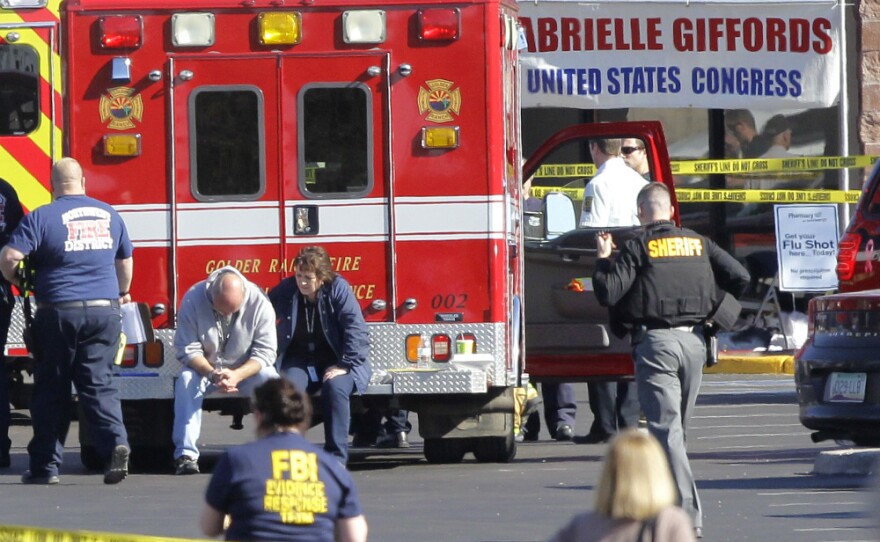The two have relied mostly on each other for support because patient privacy laws make it difficult to talk about specifics with anyone else. In fact, Southwest Ambulance says it can't even confirm that Rogers and Magnotta transported Giffords, but the Pima County Sheriff’s office released the information in a time line of events from that day.
Congresswoman Gabrielle Giffords (D-AZ) is still listed in critical condition at a Tucson, Ariz., hospital. Doctors say her recovery has been "exceptional" so far. She's opening her eyes, responding to commands and Saturday she was taken off a ventilator.
Outside the hospital, in the community she represents, mental health has been a recurring discussion topic since the shooting that left six people dead. There are questions about the alleged gunman and concern for the victims who survived. The police and firemen who responded also require special care.
Paramedic Aaron Rogers and EMT Wes Magnotta treated Giffords right after shooting and transported her to the hospital in the back of their ambulance.
Rogers and Magnotta had four days off after the shooting and are back at work now. The gruesome details of what they experienced will be with them for a long time.
"One thing that stood out for me was smell," Rogers says. "There was so much blood on-scene and it being warm, from the sun, that that's what I smelled. It was that iron-y smell."
"The thing that probably got me the most was stepping in the blood," Magnotta says. "You step over and pick your boot up and all you see is your footprint of your boot in blood."
Their employer Southwest Ambulance checked in with the two men over the days following the shooting and offered counseling.
"I'm not big on counselors and things of that nature, I'd rather talk to a friend or relative," Rogers says.
Getting back to work was important for the recovery of at least one of the shooting victims. Giffords staffer Pam Simon returned to her office Friday and seemed comfortable recalling the events that left her with gunshot wounds to her wrist and chest.
"The shots rang out almost simultaneously," she said. "I saw Gabby be shot. I saw Ron [Barber] and I think I was probably the next one shot."
Simon and just about anyone else at the Safeway store that day will be at risk for post traumatic stress disorder, but it's difficult to predict who will be affected.
"The event, actually, is not necessarily the important thing -- believe it or not," says Steven Herron, associate professor of psychiatry at the University of Arizona. "It's actually somebody's predisposition."
Herron says a history of trauma -- such as abuse -- could put someone at greater risk. To prevent PTSD, he says, it's important to surround victims with people they feel safe with and let them talk about whatever is comfortable for them.
The mental health of the alleged gunman, Jared Loughner, also has been a frequent discussion topic. For years before the shooting, people around him worried about his increasingly bizarre behavior. Friends say he withdrew from them. Employers let him go. He had run-ins with the police. The local community college said he would need a mental health evaluation before returning to class.
Arizona law makes it relatively easy to force someone to undergo a psychiatric evaluation, but there's no indication anyone around Loughner tried to get him help. Neal Cash, president and CEO of Community Partnership of Southern Arizona, suspects the stigma surrounding mental illness is partly to blame.
"The analogy I use is that if somebody is in a meeting and stands up --clutching their chest -- people will rush to that person and provide the kind of assistance that they need," Cash says. "If somebody stands up in that same meeting and starts ranting and raving, either they'll be thrown out of that meeting or people may actually run away from that person."
Cash says Tucson, and he hopes the country as a whole, will work harder now to reduce the stigma and get help for those with a mental illness.
Copyright 2022 NPR. To see more, visit https://www.npr.org. 9(MDAzMjM2NDYzMDEyMzc1Njk5NjAxNzY3OQ001))







